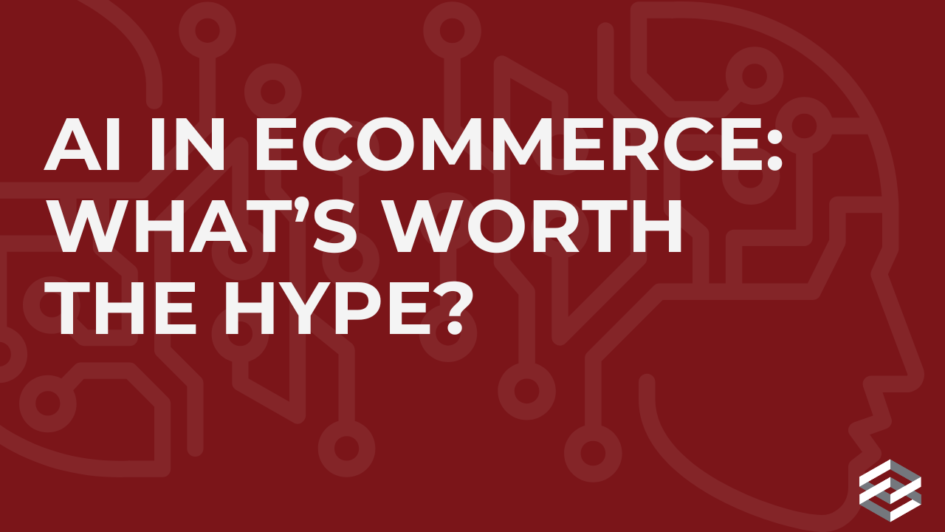Everyone is talking about Artificial Intelligence (AI). Though we may be a little tired of hearing about it, there’s no denying that there are lots of ways it can positively impact the eCommerce space. From enhancing customer experiences and streamlining operations to driving higher sales and increasing supply chain management efficiency, AI is becoming an indispensable tool for online retailers looking to grow. Here are a few areas where AI is definitely worth the hype!
1. Personalized Shopping Experiences
One of the most significant contributions of AI to eCommerce is its ability to create personalized shopping experiences. AI algorithms analyze vast amounts of customer data, such as browsing history, past purchases, and preferences, to deliver tailored product recommendations. This level of personalization increases customer satisfaction and loyalty, as shoppers are more likely to find products that meet their needs and interests.
For example, AI-powered recommendation engines suggest products or content based on users’ past behavior. These systems utilize machine learning models to predict what customers might like, making the shopping experience more relevant and engaging.
2. Chatbots and Virtual Assistants
AI-driven chatbots and virtual assistants are becoming commonplace on eCommerce websites. These tools provide instant customer support, answer frequently asked questions, assist in navigating the site, and even guide users through the purchasing process. Unlike human agents, AI chatbots are available 24/7, offering immediate responses and handling multiple queries simultaneously, which significantly improves customer service efficiency.
Moreover, advanced chatbots are now capable of natural language processing (NLP), enabling them to understand and respond to customer inquiries in a more human-like manner. This capability helps in reducing cart abandonment rates by addressing customer concerns in real-time and providing personalized assistance.

3. Optimized Inventory and Supply Chain Management
AI can optimize inventory management by predicting demand more accurately. Machine learning models analyze patterns from sales data, market trends, and external factors like seasonal changes to forecast future demand. This predictive analysis helps eCommerce businesses maintain optimal stock levels, reducing the risk of overstocking or stockouts, which can lead to lost sales or increased holding costs.
In addition to inventory management, AI is enhancing supply chain efficiency. AI algorithms can predict potential disruptions, optimize routes, and recommend the most cost-effective shipping methods. This optimization not only reduces operational costs but also ensures faster delivery, which is a critical factor in customer satisfaction.
4. Enhanced Fraud Detection and Cybersecurity
eCommerce platforms are prime targets for cyber-attacks and fraud. AI plays an important role in enhancing cybersecurity measures by detecting and preventing fraudulent activities. Machine learning models can analyze transaction patterns to identify unusual behavior, such as sudden large purchases or transactions from different geographical locations. These models are continuously learning and improving, making them more effective at spotting new types of fraud.
AI also helps in protecting customer data by identifying vulnerabilities in the system and suggesting necessary updates or changes. As cyber threats evolve, AI provides a dynamic defense mechanism that adapts to new risks, ensuring a secure shopping environment.
5. Automated Pricing and Dynamic Pricing Strategies
AI algorithms are revolutionizing pricing strategies by enabling dynamic pricing. These algorithms analyze market conditions, competitor prices, and demand elasticity to set optimal prices in real-time. This approach allows eCommerce businesses to maximize profits and remain competitive in a constantly changing market landscape.
For example, airlines and hospitality industries have long used dynamic pricing to adjust rates based on demand, booking patterns, and external factors like weather conditions or major events. eCommerce businesses are now adopting similar strategies, using AI to automate pricing adjustments and capitalize on real-time market conditions.
6. Improved Customer Insights and Predictive Analytics
AI provides eCommerce businesses with deep customer insights through predictive analytics. By analyzing customer data, AI can predict future buying behaviors and trends, allowing businesses to tailor their marketing strategies accordingly. This foresight enables more targeted advertising, personalized email campaigns, and better product assortment decisions.
Predictive analytics also help in identifying potential high-value customers, enabling businesses to focus their resources on retaining and nurturing these relationships. By understanding customer lifetime value and the factors that drive repeat purchases, eCommerce companies can implement strategies that enhance customer retention and increase revenue.

7. Visual and Voice Search Capabilities
AI is driving the adoption of visual and voice search technologies in eCommerce. Visual search allows customers to upload an image to find similar products, making it easier to discover items without needing to know specific keywords or product names. This technology leverages computer vision, a subset of AI, to identify and match visual elements.
Voice search, powered by AI-driven voice recognition systems, enables customers to shop using voice commands. With the growing popularity of smart speakers and virtual assistants like Amazon’s Alexa and Google Assistant, voice search is becoming an essential feature for eCommerce platforms. These technologies offer a more intuitive and convenient shopping experience, catering to customers who prefer hands-free browsing.
Final thoughts
The integration of AI in eCommerce is shifting how businesses operate and engage with customers. By leveraging AI, eCommerce platforms can offer personalized experiences, enhance customer service, optimize operations, and drive sales growth. As AI technology continues to advance, its impact on eCommerce will only become more profound, shaping the future of digital shopping in ways we have yet to imagine. Businesses that embrace AI today are positioning themselves for success, now and in the future.
If your commerce platform isn’t leveraging AI to enhance customer experience and optimize operations, it may be time to consider a new solution. We can help with that!

